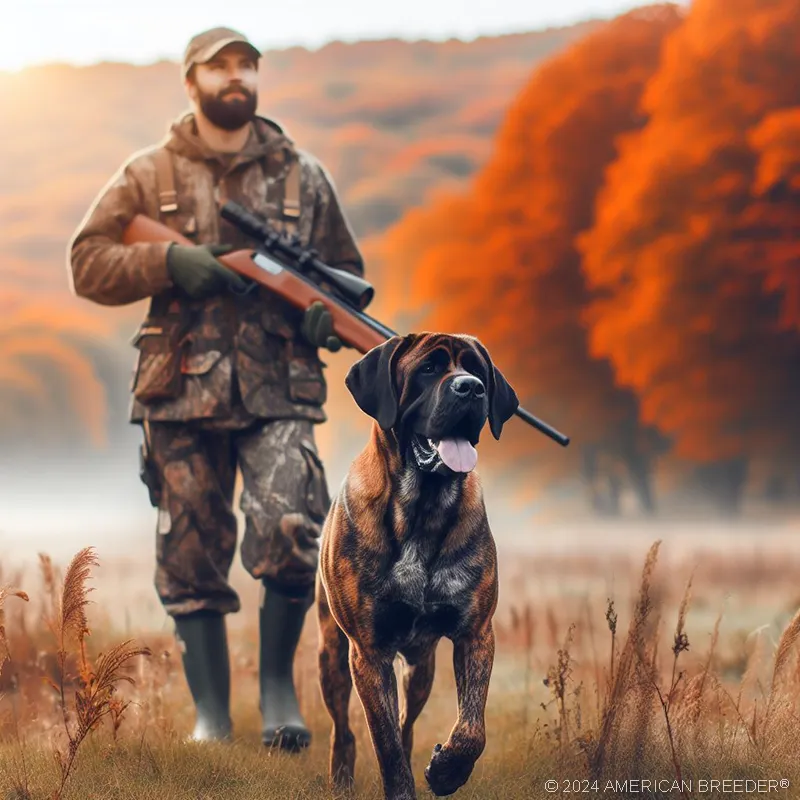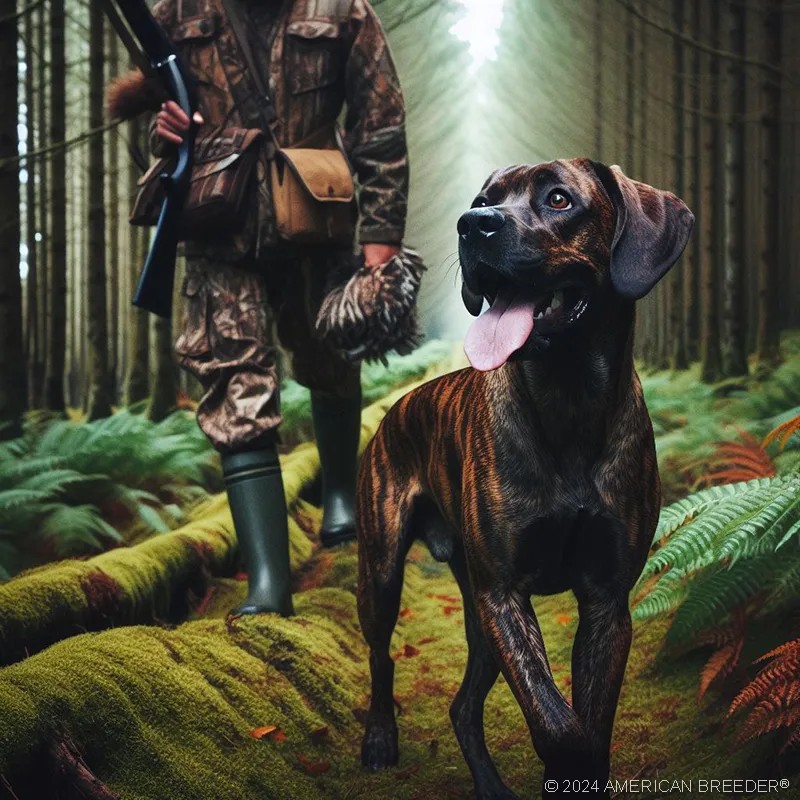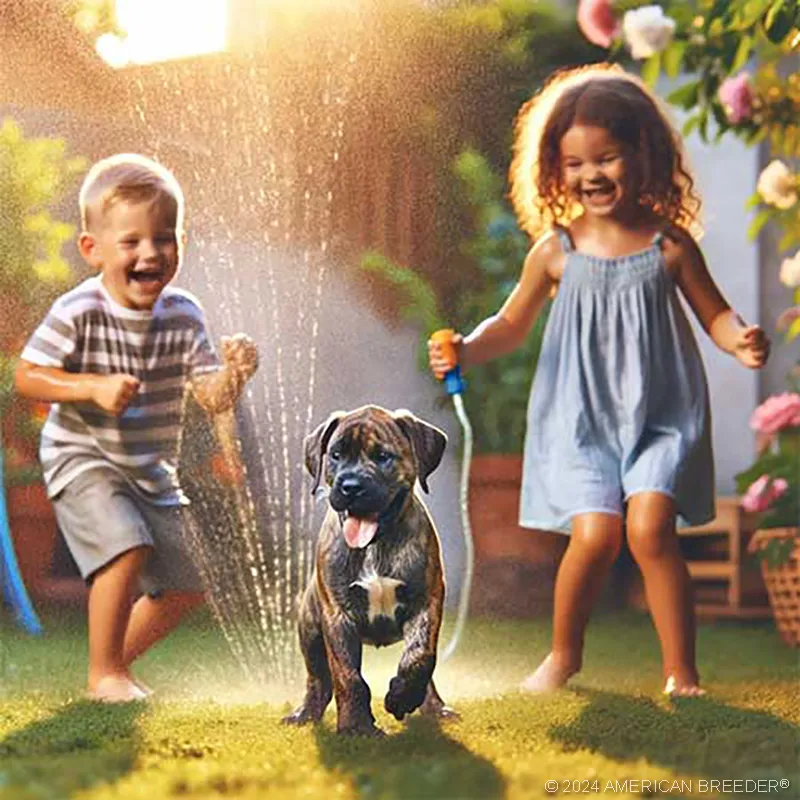The Definitive Guide to Treeing Tennessee Brindle Dogs
Introduction to the Treeing Tennessee Brindle Dog
 Origins and Heritage
Origins and Heritage
The Treeing Tennessee Brindle Dog is a breed deeply rooted in American history and culture. This captivating breed originated in the United States, with its roots tracing back to the Appalachian Mountains. Early American pioneers and hunters needed a dependable and skilled companion for hunting game, primarily raccoons. The TTB's exceptional treeing ability, where they would corner the prey in a tree until the hunter arrived, made them indispensable in the world of hunting.
Evolution and Development
The development of the TTB was driven by the need for a highly specialized hunting dog. Through the careful selection of breeding pairs, their hunting skills, agility, and treeing ability were honed over generations. These dogs played an essential role in providing food for their families and communities in the rugged terrain of the Appalachian region.
Today, TTBs have transitioned from their roles as hunting companions to cherished family pets. Their journey from the wild forests to our homes is a testament to their adaptability and enduring appeal. Understanding their origins helps us appreciate the unique blend of qualities that make TTBs such wonderful companions today.
Appearance and Distinctive Features
When it comes to appearance, TTBs are known for their distinctive and striking features. They typically stand at a medium height, with a well-muscled body that reflects their history as agile hunters. What truly sets them apart is their brindle coat, characterized by dark streaks or stripes against a lighter background. This unique coat pattern adds to their allure and makes them easily recognizable.
Their expressive eyes and alert ears are essential tools in their hunting prowess. TTBs are known for their keen senses, and their physical features play a significant role in their ability to track and tree game animals. As we continue our journey through this guide, you'll gain a deeper understanding of the physical traits that make the TTB a breed like no other.
The Temperament of the Treeing Tennessee Brindle Dog
 Friendly and Loyal Nature
Friendly and Loyal Nature
The temperament of the Treeing Tennessee Brindle Dog is a hallmark of their appeal. These dogs are renowned for their friendly and loyal nature. They form deep bonds with their families and are known to be affectionate and protective. This loyalty extends not only to their human companions but also to other pets in the household, making them excellent additions to multi-pet homes.
Energetic and Playful
TTBs are a bundle of energy and playfulness. Their hunting heritage has left them with a natural inclination to explore and stay active. Daily exercise is essential to keep them mentally and physically stimulated. Engaging them in games, such as fetch or agility training, can be an excellent way to channel their energy positively.
Compatibility with Different Lifestyles
One of the remarkable qualities of TTBs is their adaptability to different lifestyles. Whether you lead an active, outdoorsy life or prefer a quieter, indoor environment, this breed can thrive in various settings. Their friendly disposition means they often get along well with children, making them great family pets.
Addressing Potential Behavior Issues
While TTBs are known for their positive traits, like all breeds, they may encounter behavioral issues. Understanding these potential challenges and how to address them is essential. In the following chapters, we'll delve deeper into training techniques and behavior management to ensure your TTB's behavior aligns with your expectations.
Understanding the Treeing Tennessee Brindle Dog's temperament is crucial for a harmonious relationship between you and your furry friend. In the upcoming chapters, we'll explore training and obedience, care requirements, health considerations, and much more to equip you with all the knowledge you need to provide the best possible life for your TTB companion.
Training Your Treeing Tennessee Brindle Dog
 Intelligence and Trainability
Intelligence and Trainability
The Treeing Tennessee Brindle Dog is a highly intelligent breed. This intelligence, combined with their natural curiosity and eagerness to please, makes them highly trainable. Whether you're teaching basic obedience commands or advanced tricks, you'll find that your TTB is a quick learner.
Positive Reinforcement Training
When it comes to training your TTB, positive reinforcement methods work exceptionally well. These dogs respond enthusiastically to praise, treats, and playtime as rewards for good behavior. Using these techniques not only ensures effective training but also strengthens the bond between you and your furry companion.
Socialization and Exposure
Proper socialization from an early age is crucial for TTBs. Exposing them to different people, animals, and environments helps them become well-rounded adults. It also reduces the likelihood of them developing fear or aggression issues. Regular outings to the park, dog-friendly events, and playdates can be highly beneficial.
Exercise and Mental Stimulation
Beyond obedience training, TTBs require mental stimulation to keep them happy and well-behaved. Puzzle toys, interactive games, and challenging tasks can help fulfill their need for mental engagement. Remember that a tired TTB is a well-behaved one, so be sure to provide ample exercise to prevent restlessness.
Understanding your TTB's intelligence and training needs will pave the way for a well-mannered and contented companion. In the next chapter, we'll explore their physical care requirements, including grooming, feeding, and health considerations, ensuring your TTB lives a long and healthy life.
Caring for Your Treeing Tennessee Brindle Dog
 Grooming Needs
Grooming Needs
Despite their brindle coat, TTBs have relatively low grooming needs. Regular brushing to remove loose fur and dirt is usually sufficient to keep their coat in excellent condition. Occasional baths may be required, especially if your TTB enjoys outdoor adventures.
Dietary Considerations
A balanced diet is essential for your TTB's overall health. High-quality dog food that meets their nutritional needs is recommended. Be mindful of portion control to maintain a healthy weight, as TTBs can be prone to obesity if overfed. Consult with your veterinarian for specific dietary recommendations.
Health Care
Like all breeds, TTBs may be prone to certain health issues, including hip dysplasia, bloat, and allergies. Regular vet check-ups and vaccinations are essential to catch and address potential problems early. Your veterinarian can also advise you on parasite prevention and dental care.
Lifespan Expectations
On average, Treeing Tennessee Brindle Dogs have a lifespan of 10 to 12 years. Providing proper care, nutrition, and regular exercise can contribute to a longer, healthier life for your furry companion. Cherishing the time you have together is an essential part of being a responsible TTB owner.
By addressing your TTB's grooming, dietary, and health needs, you're ensuring their overall well-being. In the following chapter, we'll explore socialization and compatibility, including interactions with children and other pets, to help you create a harmonious environment for your TTB at home.
Socialization and Compatibility
 Interaction with Children
Interaction with Children
Treeing Tennessee Brindle Dogs are known for their affectionate and gentle nature, making them great companions for families with children. They often form strong bonds with kids and can be quite protective. However, it's crucial to teach children how to interact respectfully with the dog to ensure a positive relationship for both parties.
Coexistence with Other Pets
TTBs are generally good with other pets, including cats, when properly socialized. Early introductions and consistent positive interactions can help your TTB get along with other animals in your household. However, it's important to monitor their interactions until you're confident that they coexist peacefully.
Socialization Needs
Socialization doesn't stop at puppyhood. Regular exposure to different people, animals, and environments is essential throughout your TTB's life. Consider enrolling in obedience classes, visiting dog parks, or arranging playdates to maintain their social skills and prevent behavioral issues.
Precautions in Multi-Dog Households
If you have multiple dogs, it's vital to establish clear rules and maintain a harmonious pack dynamic. Ensure that each dog has its space, and monitor their interactions, especially during mealtimes and play. Consistency in training and supervision is key to a peaceful multi-dog household.
Ease of Training
TTBs' intelligence and eagerness to please make them relatively easy to train. However, their independent nature may sometimes lead to stubbornness. Patience, positive reinforcement, and consistency are essential when training your TTB, and advanced training classes can be beneficial for both you and your dog.
In the next chapter, we'll explore the living arrangements and environmental considerations that will help ensure your TTB's comfort and happiness in your home. This includes tips on adapting to different environments and creating an ideal living space for your furry friend.
Living Arrangements and Environmental Considerations
 Adaptability to Different Environments
Adaptability to Different Environments
The Treeing Tennessee Brindle Dog is a versatile breed that can adapt to various living environments. Whether you live in a spacious rural area or a compact urban apartment, TTBs can thrive with the right care and attention.
Rural Living
In rural settings, TTBs have room to explore and exercise to their heart's content. These dogs excel in outdoor spaces, making them great companions for farmers or those who enjoy an active rural lifestyle. They're well-suited for hunting and tracking tasks in these environments.
Urban Living
Even in urban areas, TTBs can make fantastic pets, provided they receive enough exercise and mental stimulation. Regular walks, trips to dog parks, and interactive playtime are essential for urban TTBs. Apartment living can work as long as you meet their activity needs.
Climate Considerations
TTBs are adaptable to various climates, but it's crucial to take precautions during extreme weather conditions. In hot weather, ensure your dog has access to shade and plenty of water to prevent overheating. During cold weather, provide warm shelter and protection from frostbite, especially for their ears and paws.
Yard Size Recommendations
While TTBs can adapt to smaller yards or city living, they will thrive in homes with more outdoor space. A fenced yard where they can run and explore safely is ideal. Regular exercise is key to preventing boredom-related behavioral issues.
Ideal Living Conditions
The ideal living conditions for a Treeing Tennessee Brindle Dog include a loving and active family, access to both indoor and outdoor spaces, and plenty of opportunities for physical and mental stimulation. These dogs thrive when they are an integral part of the family, receiving love, attention, and care.
In the following chapter, we will delve into training and obedience for TTBs, offering insights into their intelligence, exercise needs, and how to foster a strong bond through responsible ownership.
Training and Obedience
Treeing Tennessee Brindle Dogs are known for their intelligence and willingness to please, making them relatively easy to train. However, they do have some unique traits and training needs to keep in mind.
TTBs are highly intelligent dogs. They quickly grasp commands and concepts, which can make training sessions productive and enjoyable. However, their independent nature means they may occasionally test boundaries. Consistency and positive reinforcement are essential for successful training.
Exercise Needs
These dogs have moderate to high exercise needs. Regular physical activity is crucial to keep them mentally and physically stimulated. Long walks, runs, and interactive play sessions are great ways to satisfy their energy levels. Without enough exercise, they may become bored and engage in undesirable behaviors.
Socialization
Proper socialization is vital for TTBs to ensure they are well-adjusted and comfortable around people and other animals. Start socialization early and expose them to various environments, people, and dogs. This helps prevent potential behavioral issues.
Behavioral Considerations
TTBs are generally friendly and affectionate dogs, but they can have a strong prey drive. They may chase small animals, so be cautious when introducing them to cats or other small pets. Proper training and supervision can help manage this tendency.
Bonding and Trust
Building a strong bond with your TTB is essential for a harmonious relationship. Spend quality time together, engage in activities they enjoy, and establish trust through positive reinforcement training methods. A well-trained and bonded TTB makes for a loyal and loving companion.
 Responsible Ownership
Responsible Ownership
Owning a TTB comes with responsibilities. You must commit to providing proper training, exercise, socialization, and healthcare. Additionally, ensure they receive regular veterinary check-ups and are up-to-date on vaccinations. Responsible ownership contributes to the health and happiness of your dog.
Legal Responsibilities
Understand and follow local laws and regulations related to dog ownership. This may include leash laws, licensing, and vaccination requirements. Complying with these laws ensures the safety of your TTB and others in the community.
Resources and Support
Seek out resources and support to assist you in raising a happy and well-behaved TTB. Joining dog training classes, forums, or local breed clubs can provide valuable insights and a sense of community. Remember, you're not alone in your journey of raising a Treeing Tennessee Brindle Dog.
In the next chapter, we'll provide a summary of all the essential information covered in this comprehensive guide, giving you a complete overview of the Treeing Tennessee Brindle Dog and its significance as a canine companion.
Summary
 Characteristics and Appearance
Characteristics and Appearance
The Treeing Tennessee Brindle Dog is a medium-sized breed known for its striking brindle coat. They have a well-muscled body, expressive eyes, and floppy ears. This breed showcases both elegance and strength in its appearance.
History and Origins
TTBs have a rich history deeply rooted in the Appalachian region of the United States. They were originally bred for their hunting prowess, particularly in treeing game such as raccoons and squirrels. This breed's heritage is a testament to their endurance and tenacity.
Temperament and Personality
Known for their friendly and affectionate nature, TTBs make excellent family pets. They are social dogs that enjoy human companionship. Their intelligence and trainability make them a joy to work with, but they can have a strong prey drive that requires careful management.
Care and Maintenance
To keep your TTB healthy and happy, provide them with regular exercise, a balanced diet, and proper grooming. Be aware of common health issues such as hip dysplasia and allergies, and seek veterinary care when needed.
Training and Obedience
TTBs are intelligent and eager to learn, but they require consistent training and positive reinforcement techniques. Socialize them early to ensure they are comfortable around other pets and people.
Responsible Ownership
Owning a TTB comes with responsibilities that include proper training, socialization, exercise, and healthcare. Comply with local laws and regulations related to dog ownership to ensure the safety of your TTB and the community.
In conclusion, the Treeing Tennessee Brindle Dog is a remarkable breed with a rich history and an exceptional temperament. Their loyalty, intelligence, and affectionate nature make them fantastic companions for families and individuals alike. By providing them with the care and training they need, you can enjoy a fulfilling and lasting bond with your TTB.
Remember that this guide is a valuable resource for both new and experienced TTB owners. Whether you're considering bringing one into your home or you've been a TTB enthusiast for years, the knowledge shared here will enhance your understanding and appreciation of this unique breed.
Thank you for joining us on this journey through the world of the Treeing Tennessee Brindle Dog. We hope this guide serves as a valuable reference and enhances your relationship with your four-legged friend.
Conclusion
 Congratulations on reaching the end of this comprehensive guide to the Treeing Tennessee Brindle Dog! We hope this resource has been both informative and enjoyable, offering you a deep understanding of this remarkable breed and equipping you with the knowledge to provide the best care for your TTB companion.
Congratulations on reaching the end of this comprehensive guide to the Treeing Tennessee Brindle Dog! We hope this resource has been both informative and enjoyable, offering you a deep understanding of this remarkable breed and equipping you with the knowledge to provide the best care for your TTB companion.
In this guide, we've explored every facet of the Treeing Tennessee Brindle Dog, from their historical origins as skilled hunters to their unique temperament, physical characteristics, and care requirements. We've delved into their social behavior, training needs, and health considerations, ensuring that you're well-prepared for the journey of owning one of these exceptional dogs.
As a TTB owner, you're now part of a passionate and welcoming community of enthusiasts who appreciate the breed's intelligence, loyalty, and unwavering companionship. Whether you're a first-time dog owner or an experienced handler, your Treeing Tennessee Brindle will undoubtedly bring joy and fulfillment to your life.
Remember that while this guide provides a comprehensive overview, each TTB is an individual with their own personality and needs. Building a strong bond with your dog, understanding their unique quirks, and tailoring your care and training to their specific requirements will result in a happy and harmonious partnership.
Finally, stay connected with the Treeing Tennessee Brindle community through breed clubs, online forums, and events. These resources will offer ongoing support, insights, and camaraderie throughout your journey as a TTB owner.
Thank you for choosing the Treeing Tennessee Brindle Dog as your loyal companion. We wish you many years of love, laughter, and cherished memories with your furry friend. May your TTB bring boundless happiness to your life, just as they have to countless others.
As you embark on this journey, always remember that you're not just a dog owner; you're a proud member of the Treeing Tennessee Brindle family. Here's to a wonderful partnership filled with adventures, wagging tails, and a love that knows no bounds.
Treeing Tennessee Brindle Dog Quick Reference Guide
 Breed Background: Origin: Southern Appalachian region, USA | Breed Purpose: Hunting and treeing game | AKC Class: Not recognized by AKC | Year Recognized by AKC: Not applicable
Breed Background: Origin: Southern Appalachian region, USA | Breed Purpose: Hunting and treeing game | AKC Class: Not recognized by AKC | Year Recognized by AKC: Not applicable
Appearance: Size: Medium | Weight: 30-50 pounds | Coat Type: Short, dense brindle coat | Colors & Patterns: Brindle | Distinctive Features: Long, floppy ears, and a tapered tail
Temperament: Energy Level: 5 | Loyalty: 5 | Friendliness to Pets: 3 | Friendliness to Strangers: 4 | Trainability: 4 | Playfulness: 5 | Frequent Barker: 2 | Chase Instincts: 5 | Sense of Smell: 5 | Drive to Hunt: 5
Health & Care: Health Issues: Hip dysplasia, ear infections, obesity | Lifespan: 10-12 years | Grooming Difficulty: Low | Exercise Needs: High
Socialization: Interaction with Children: Good, with supervision | Interaction with Pets: Variable, socialization is key | Interaction with Strangers: Friendly but may bark | Elderly Compatibility: Not ideal | Ease of Training: Moderate
Suitable Living Arrangements: Apartment: No | House: Yes | Rural Area: Preferred | Yard Size Requirements: Moderate-sized yard preferred
Training & Obedience: Trainability: 3 | Intelligence: 4 | Obedience: 3 | Problem-Solving: 4 | Easily Stimulated: 5 | Focus Level: 3 | Easily Distracted: 4
Financial Planning: Typical Price Range: $500 - $1,500 | Initial Expenses: Puppy purchase, vaccinations, spaying/neutering | Ongoing Annual Expenses: Food, grooming, veterinary care
Breeding: Reproductive Maturity: Around 6-12 months | Litter Frequency: Typically 1-2 litters per year | Litter Size: 4-6 puppies | Stud Cost: Varies widely | Breeding Challenges: Finding suitable mates, ensuring the health of the breeding pair
Did You Enjoy this Article? Share it and Help Us Spread the Word!
If you found this article helpful, we'd appreciate it if you could share it with your friends or link to it from your website, blog, or group! You can also use the convenient social share tabs on the left side of the screen to instantly share this page to your social media feed. For more ways to support and promote the American Breeder Community, visit our Share & Promote Together page for social media posts and memes you can copy and share. Your support means the world to us!
Disclaimer: The information provided in this article is for general informational purposes only and does not constitute legal, medical, financial, or professional advice. While we strive for accuracy, we make no representations or warranties regarding the completeness, accuracy, reliability, or suitability of the information. Please consult with a professional before making decisions based on the content provided. American Breeder Inc. assumes no responsibility for any errors or omissions or for the results obtained from the use of this information.

